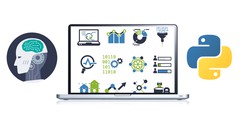

Learn Python for Data Science & Machine Learning from A-Z
In this practical, hands-on course you’ll learn how to program using Python for Data Science and Machine Learning. This includes data analysis, visualization, and how to make use of that data in a practical manner.
Our main objective is to give you the education not just to understand the ins and outs of the Python programming language for Data Science and Machine Learning, but also to learn exactly how to become a professional Data Scientist with Python and land your first job.
We'll go over some of the best and most important Python libraries for data science such as NumPy, Pandas, and Matplotlib +
NumPy — A library that makes a variety of mathematical and statistical operations easier; it is also the basis for many features of the pandas library.
Pandas — A Python library created specifically to facilitate working with data, this is the bread and butter of a lot of Python data science work.
NumPy and Pandas are great for exploring and playing with data. Matplotlib is a data visualization library that makes graphs as you’d find in Excel or Google Sheets. Blending practical work with solid theoretical training, we take you from the basics of Python Programming for Data Science to mastery.
This Machine Learning with Python course dives into the basics of machine learning using Python. You'll learn about supervised vs. unsupervised learning, look into how statistical modeling relates to machine learning, and do a comparison of each.
We understand that theory is important to build a solid foundation, we understand that theory alone isn’t going to get the job done so that’s why this course is packed with practical hands-on examples that you can follow step by step. Even if you already have some coding experience, or want to learn about the advanced features of the Python programming language, this course is for you!
Python coding experience is either required or recommended in job postings for data scientists, machine learning engineers, big data engineers, IT specialists, database developers, and much more. Adding Python coding language skills to your resume will help you in any one of these data specializations requiring mastery of statistical techniques.
Together we’re going to give you the foundational education that you need to know not just on how to write code in Python, analyze and visualize data and utilize machine learning algorithms but also how to get paid for your newly developed programming skills.
The course covers 5 main areas:
1: PYTHON FOR DS+ML COURSE INTRO
This intro section gives you a full introduction to the Python for Data Science and Machine Learning course, data science industry, and marketplace, job opportunities and salaries, and the various data science job roles.
Intro to Data Science + Machine Learning with Python
Data Science Industry and Marketplace
Data Science Job Opportunities
How To Get a Data Science Job
Machine Learning Concepts & Algorithms
2: PYTHON DATA ANALYSIS/VISUALIZATION
This section gives you a full introduction to the Data Analysis and Data Visualization with Python with hands-on step by step training.
Python Crash Course
NumPy Data Analysis
Pandas Data Analysis
3: MATHEMATICS FOR DATA SCIENCE
This section gives you a full introduction to the mathematics for data science such as statistics and probability.
Descriptive Statistics
Measure of Variability
Inferential Statistics
Probability
Hypothesis Testing
4: MACHINE LEARNING
This section gives you a full introduction to Machine Learning including Supervised & Unsupervised ML with hands-on step-by-step training.
Intro to Machine Learning
Data Preprocessing
Linear Regression
Logistic Regression
K-Nearest Neighbors
Decision Trees
Ensemble Learning
Support Vector Machines
K-Means Clustering
PCA
5: STARTING A DATA SCIENCE CAREER
This section gives you a full introduction to starting a career as a Data Scientist with hands-on step by step training.
Creating a Resume
Creating a Cover Letter
Personal Branding
Freelancing + Freelance websites
Importance of Having a Website
Networking
By the end of the course you’ll be a professional Data Scientist with Python and confidently apply for jobs and feel good knowing that you have the skills and knowledge to back it up.

Feedbacks (1)